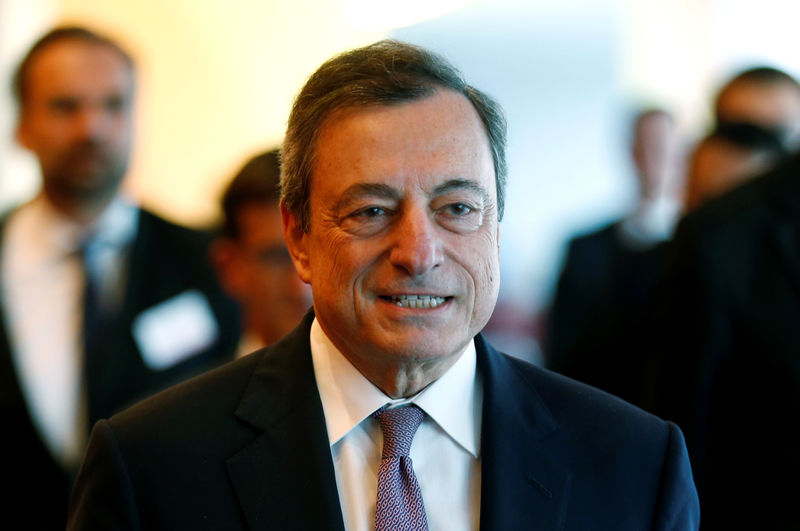(Bloomberg) -- Mario Draghi is once again testing the boundaries of the law in his efforts to lift the euro zone out of its economic malaise.
When the European Central Bank president promised last week to add monetary stimulus if the outlook doesn’t improve, he said one option is to resume large-scale purchases of government bonds. He also said self-imposed limits on how much debt the institution can buy could be raised.
That raises a potential legal hurdle, as those limits were designed to ensure the ECB doesn’t fall foul of European Union law that forbids printing money to fund governments. While the EU’s top court has said quantitative easing is legal, judges in Germany -- which is critical for the success of QE as the biggest buyer of debt under the program -- haven’t yet issued a final ruling on a challenge there.
The German court said on Tuesday that it’ll hold fresh hearings on July 30-31 to review the EU Court of Justice’s guidance before making its own decision.
“If the ECB resumes bond purchases under weakened conditions, our chances of success at the Federal Constitutional Court will rise,” Bernd Lucke, a German economist and one of the plaintiffs in that case, said via a spokesman. “I hope and expect that the court will immediately stop them.”
German businessman Juergen Heraeus, another of the plaintiffs, said he’d wait for the court’s ruling before deciding whether to launch another challenge.
The ECB has so far agreed to buy up to 33% of a nation’s public debt under QE, and won’t buy directly from governments. There is a 50% limit on debt from supranational agencies such as the European Investment Bank. The idea is to leave investors room to operate so that the market rather than the central bank sets the price of bonds.
According to Draghi, those limits depend on the economic risks facing the euro zone.
“The Treaty requires that our actions are both necessary and proportionate to fulfill our mandate and achieve our objective, which implies that the limits we establish on our tools are specific to the contingencies we face.”-- ECB President Draghi in Sintra, Portugal, on June 18
The ECB chief is no stranger to legal challenges to his policies. An earlier bond-buying program to tackle financial stress in individual nations, created after he pledged to do “whatever it takes” to save the euro and known as Outright Monetary Transactions, went to Germany’s constitutional court -- where Bundesbank President Jens Weidmann testified against it. The judges ruled that OMT is legal if purchases are limited. The program has never been used.
When the same court heard the challenge to QE, it cited “grave reasons” to suspect that the program infringes the law before sending the case to the EU court. The EU judges said QE “does not exceed the ECB’s mandate and does not contravene the prohibition of monetary financing.”
The ECB is in a bind. The euro zone’s economic revival is under threat from trade tensions and inflation remains far short of the goal of just under 2%. Yields on sovereign bonds across the euro area have slumped to record lows in recent weeks as investors bet that the central bank will have to restart QE sooner rather than later.
The problem is that after 2.6 trillion euros ($3 trillion) of bond purchases from 2015 to the end of 2018, it’s getting close to its limits. While Draghi said there is “considerable headroom” to buy more, analysts aren’t so sure. Citigroup (NYSE:C) sees scope for additional purchases of only around 150 billion euros.
Some economists have run simulations based on an increase in the purchase limit to 50%. If the ECB bought federal, regional and municipal debt to that extent, it would create space for 60 billion euros a month for two years, according to TS Lombard’s Shweta Singh and Davide Oneglia.
The next policy meeting is on July 25, and Draghi will convene two more after that before he leaves at the end of October. Economists expect interest rates to be cut again before QE is restarted, and money markets are pricing a 10-basis point cut to the deposit rate in September.
Should a resumption of QE with higher purchase limits become a policy proposal at some point though, Governing Council members will have to consider whether they’re confident enough to handle yet another legal battle.
“It’s difficult to say whether the ECB’s self-imposed rules are the limits allowed by the EU’s treaties,” said Christoph Ohler, a law professor at Jena University. “The ban on monetary financing of states doesn’t set any outright caps for government-bond purchases, but that doesn’t mean there are no restrictions.”
